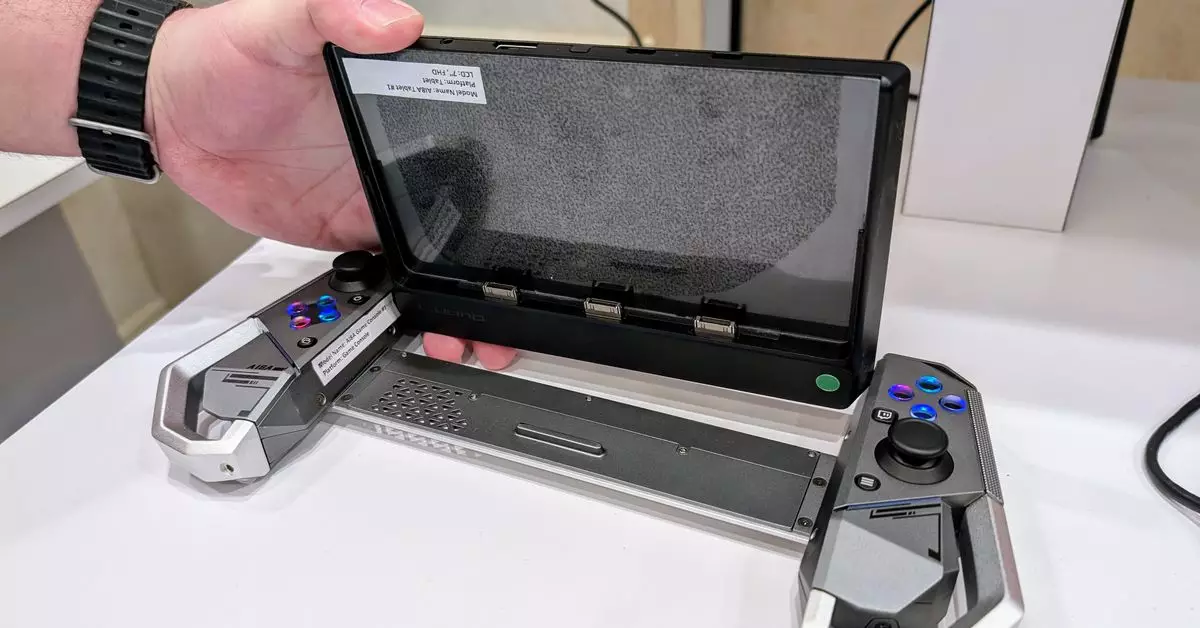At CES 2025, Intel opened its doors to a select group of journalists for an exclusive look at its “Innovation Showcase.” This annual event is a platform where tech giants unveil cutting-edge technologies. Among the plethora of new gadgets, attention was drawn to unique devices, particularly a concept that reimagines modular computing. Intel’s showcase featured next-generation laptops and innovative handheld gaming devices. However, amid these impressive displays, one prototype caught the eye for its ambitious design and intriguing potential.
A standout device was a handheld gaming computer that appeared incomplete, raising immediate curiosity about its structure. Upon inspection, it was discovered that its screen did not adhere firmly to its base, suggesting a modular design. The revelation came when Intel’s gaming evangelist, Colin Helms, confirmed that this device is part of a concept modular PC that incorporates a complete Intel Lunar Lake computer. Interestingly, this concept, dubbed the “AI8A,” marks a resurgence of ideas from Intel’s earlier Compute Card initiative but diverges significantly in execution and presentation.
Quanta, a relatively unknown name among mainstream consumers but a dominant player in original design manufacturing (ODM), is behind this innovation. The AI8A aims to allow users to upgrade their computing experience simply by swapping out modules, providing a convenient and flexible solution to evolving tech needs. This design concept emphasizes adaptability, enabling users to evolve their systems in line with their requirements without the need for entirely new devices.
The modular laptop boasted a suite of high-tech features, many of which were still being fine-tuned by Intel’s team. Noteworthy among them was a motorized hinge, allowing the laptop lid to open and close autonomously—a futuristic idea with practical implications for accessibility. Furthermore, it was equipped with eye-tracking technology, facilitating a seamless multitasking experience by enabling users to move windows around simply by directing their gaze.
One of the more intriguing design elements was a wearable mouse integrated into a ring, offering an innovative way to interact with the device without the conventional limitations of traditional input methods. More standard features, such as a built-in Qi wireless charging pad placed conveniently in the palmrest, were also included, highlighting the blend of novel and functional designs aimed to enhance user experience.
While the AI8A showcases impressive technological advancements, it’s crucial to recognize that it’s still a concept. The idea of a fully functional modular computing device raises multiple questions: Will it navigate the complexities of consumer tech and gain traction in a market dominated by established designs? Can it effectively compete against more traditional, reliable systems? As compelling as these features may be, journalists and tech enthusiasts alike were left with the understanding that such innovative concepts often face hurdles before transitioning to market-ready products.
It’s essential to manage expectations; while concepts like the AI8A offer a glimpse into a potentially modular future, similar initiatives in the past, like Intel’s Compute Card, were shelved and never made it to the retail market. However, there are notable strides being made in modularity for laptops; companies like Framework have entered the arena, suggesting that there is a growing interest and demand for repairable and upgradable devices.
The landscape of technology is continually evolving, and initiatives like the AI8A at CES 2025 ignite conversations about the future of computing. While seeing a prototype like this is exciting, it serves as a reminder of the balance between visionary ideas and practical applications. The potential for modular designs to enhance personalization and longevity in laptops is increasingly important in a world that values sustainability and adaptability.
As technology developers and consumers navigate this changing landscape, the conversation around modular devices will likely sharpen, urging manufacturers to find a middle ground between novel concepts and actionable products. CES 2025 may very well mark the beginning of a new chapter in computing, one that invites users to rethink the very nature of how we utilize and personalize technology.

